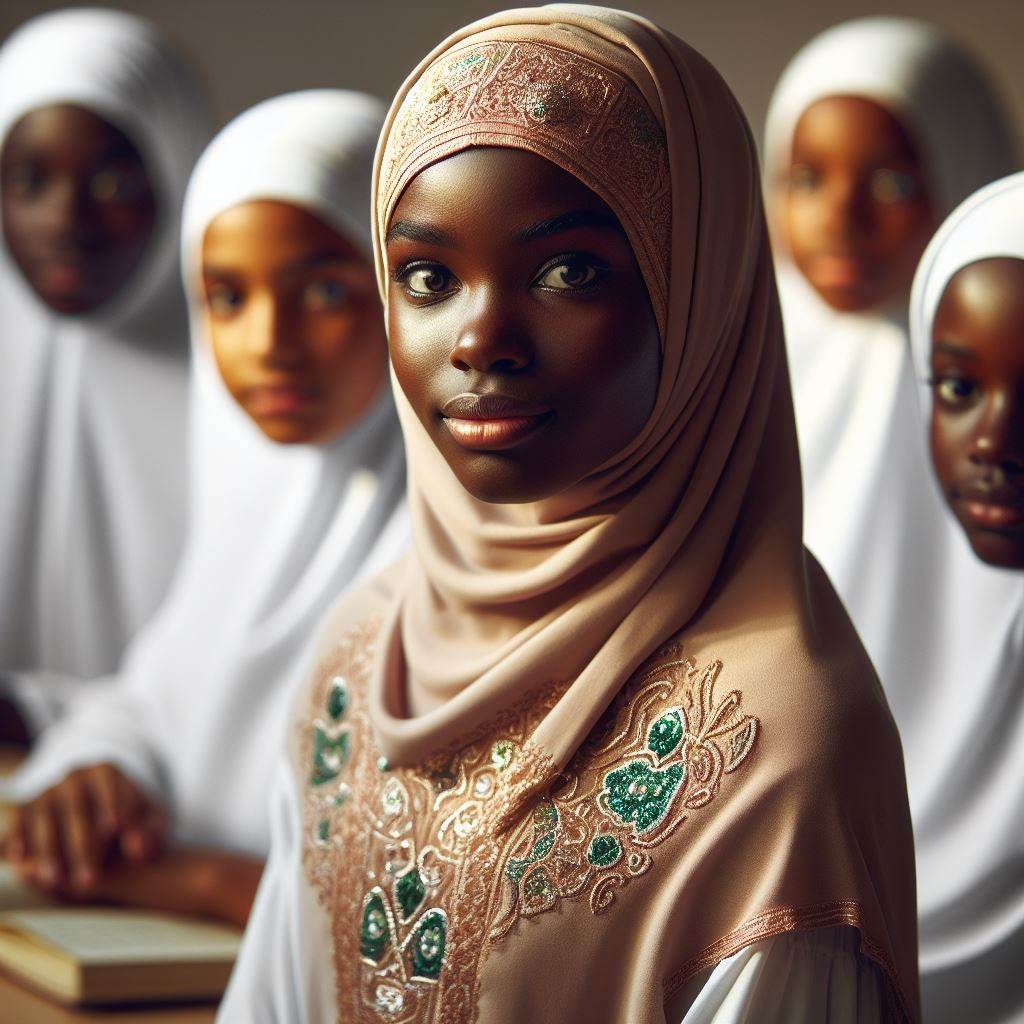Introduction
Nigeria’s educational and cultural landscape is significantly shaped by Arabic and Islamic Studies, reflecting diverse heritage and religious traditions.
Historically, these studies date back centuries to the spread of Islam in Nigeria. They encompass language, theology, jurisprudence, history, and literature.
Arabic and Islamic Studies in Nigeria include:
- Language: Learning Arabic to read religious texts and communicate.
- Theology: Understanding Islamic beliefs and practices.
- Jurisprudence: Studying Islamic law and its applications.
- History: Exploring the historical spread and influence of Islam.
- Literature: Appreciating classical and contemporary Islamic writings.
These studies reflect Nigeria’s rich cultural heritage and Islam’s enduring influence. They promote religious understanding, cultural appreciation, and intellectual engagement among students.
The role of Arabic and Islamic Studies is vital in Nigerian education. They foster a deeper understanding of Islamic traditions. Students gain insights into the historical context of Islam in Nigeria.
Secular institutions integrate these studies to enhance cultural knowledge. Religious schools emphasize them to deepen faith and practice. Arabic and Islamic Studies encourage a holistic approach to education in Nigeria.
They bridge cultural gaps and foster mutual respect among diverse groups. By studying these disciplines, students develop critical thinking and analytical skills.
In review, Arabic and Islamic Studies are crucial in Nigeria. They enrich the educational experience and preserve the nation’s cultural and religious traditions.
The Future of Arabic and Islamic Studies in Nigeria
Current Challenges Faced
Limited resources and funding for these studies
The availability of resources plays a crucial role in the development of Arabic and Islamic studies in Nigeria.
Unfortunately, there is a lack of adequate funding and resources for these studies in the country.
Due to limited financial backing, educational institutions offering Arabic and Islamic studies struggle to provide necessary materials, books, and technologies for effective learning.
This hinders the overall growth and advancement of these fields.
Lack of qualified teachers and institutions
Another significant challenge facing Arabic and Islamic studies in Nigeria is the shortage of qualified teachers and institutions. The demand for skilled educators in these fields surpasses the available supply, resulting in a shortage of competent professionals.
Moreover, the existing institutions may not meet the required standards to deliver quality education in Arabic and Islamic studies. This lack of qualified teachers and institutions hampers the capacity to impart in-depth knowledge and understanding of these subjects.
Influence of Western education on traditional Islamic teachings
The influence of Western education on traditional Islamic teachings is a pressing challenge in Nigeria.
With the proliferation of Western educational systems and ideologies, there is a risk of diluting the essence and authenticity of Arabic and Islamic studies.
The emphasis on Western education could overshadow the importance of traditional Islamic teachings, leading to a disconnect between the younger generation and their cultural heritage.
This threat poses a challenge to the preservation and promotion of Arabic and Islamic studies in the country.
In essence, addressing these challenges is vital to secure the future of Arabic and Islamic studies in Nigeria.
By investing in resources, enhancing teacher quality, and preserving traditional teachings, the country can strengthen the foundation of these fields for generations to come.
Read: Global Impact of African and Asian Studies Research
Potential Opportunities for Growth
As Nigeria navigates its educational and economic landscape, there are notable opportunities for growth within Arabic and Islamic Studies. This section explores three key areas of potential development:
Increasing Interest in Arabic and Islamic Studies Among Nigerian Youth
Nigerian youth increasingly pursue Arabic and Islamic Studies due to cultural heritage, religious identity, and global connectivity.
This trend presents an opportunity to expand educational offerings and support initiatives that promote the study of Arabic language, Islamic history, and theology.
Nurturing this interest, Nigeria can cultivate scholars and professionals well-versed in Islamic traditions. They engage with global issues informedly.
Demand for Skilled Professionals in Islamic Finance, Law, and Education
The escalating demand for proficient professionals in Islamic finance, law, and education presents a substantial growth opportunity within Arabic and Islamic Studies.
Nigeria’s burgeoning Islamic finance industry requires individuals knowledgeable in Islamic banking principles, Shariah-compliant products, and ethical investment practices.
Moreover, the legal sector and educational institutions in the country are in dire need of professionals who possess a profound understanding of Islamic law and pedagogy.
Global Recognition of Nigeria’s Potential in These Disciplines
Nigeria’s rich cultural heritage, diverse population, and strategic location make it a potential hub for Arabic and Islamic Studies on the global stage.
Scholars and institutions worldwide recognize the country’s vibrant academic community and its growing influence in international affairs.
By leveraging this reputation, Nigeria can attract investment, forge partnerships, and position itself as a center of excellence for Arabic and Islamic Studies.
This, in turn, can enhance the country’s soft power, promote cross-cultural dialogue, and contribute to global scholarship in these disciplines.
In fact, Nigeria stands at the cusp of exciting opportunities for growth within Arabic and Islamic Studies.
Nigeria can unlock its full potential in Arabic and Islamic scholarship by harnessing youth interest and addressing professional demand.
Read: Leading Communication Arts Departments in Nigeria
Role of government and institutions
Arabic and Islamic studies in Nigeria are critical aspects of education that require significant support from the government and institutions. Let’s delve into the role they play in shaping the future of these studies.
Need for increased investment in Arabic and Islamic education
One of the key factors in ensuring the growth and sustainability of Arabic and Islamic studies in Nigeria is by increasing investment in these fields.
The government and relevant institutions need to allocate more resources to support the development of programs, research, and infrastructure in this area.
This investment will help in attracting more students, scholars, and researchers to engage in the study of Arabic and Islamic disciplines.
Collaboration with international organizations and universities
Collaborating with international organizations and universities can bring about invaluable partnerships that can enhance the quality of education in Arabic and Islamic studies.
These collaborations can lead to exchange programs, joint research projects, and access to resources that would otherwise be unavailable.
By engaging with international entities, Nigeria can tap into global expertise and best practices in teaching, research, and curriculum development.
Development of curricula and training programs to meet industry standards
Institutions offering Arabic and Islamic studies must align curricula and training programs with industry standards to stay competitive.
Regularly reviewing and updating course content reflects the evolving needs of the job market and wider society.
By ensuring that students are equipped with the relevant skills and knowledge, institutions can better prepare them for future employment opportunities.
In a nutshell, the role of the government and institutions in supporting Arabic and Islamic studies in Nigeria cannot be overstated.
Nigeria can ensure sustainability and growth of Arabic and Islamic education by investing, collaborating, and developing industry-relevant programs.
Read: Comparing Communication Arts and Mass Communication

Find Out More: Famous Nigerian Graduates in Communication Studies
Strategies for promoting Arabic and Islamic studies
Establishment of specialized schools and centers of excellence
One key strategy for promoting Arabic and Islamic studies in Nigeria is the establishment of specialized schools and centers of excellence dedicated to these subjects.
These institutions deepen students’ understanding of Arabic and Islamic studies through intensive and focused education.
Incorporation of technology and online learning platforms
Educators incorporate technology and online platforms to teach Arabic and Islamic studies, reaching a broader student audience nationwide.
Encouragement of research and publications in the field
Lastly, a key strategy for promoting Arabic and Islamic studies in Nigeria is the encouragement of research and publications in the field.
Scholars contribute new insights and knowledge to Arabic and Islamic studies by supporting academic research and publications.
Read: Language Learning in African and Asian Studies
Gain More Insights: Mass Communication vs Journalism: Key Differences
Addressing Misconceptions and Stereotypes
In order to secure the future of Arabic and Islamic studies in Nigeria, it is crucial to address the misconceptions and stereotypes surrounding these fields.
There is a common misunderstanding that Arabic and Islamic studies are only relevant to a particular group of people or that they promote extremism.
However, this couldn’t be further from the truth.
Promoting dialogue and understanding of Islamic principles
By promoting dialogue and understanding of Islamic principles, we can foster a more inclusive and diverse learning environment.
It is important to emphasize that Islamic teachings are based on values of peace, compassion, and justice.
By engaging in meaningful conversations about these principles, we can break down barriers and create a more harmonious society.
The Contributions of Arabic and Islamic Scholars to Nigerian Society
Arabic and Islamic scholars have made significant contributions to Nigerian society in various fields.
From education to community development, these scholars have played a crucial role in shaping the cultural and intellectual landscape of the country.
It is essential to recognize and celebrate their achievements to inspire future generations to continue their legacy.
By highlighting the achievements of Arabic and Islamic scholars, we can showcase the positive impact that these fields have had on Nigerian society.
Scholars contribute through research, initiatives, and advocacy, deserving recognition for their invaluable contributions.
Encouraging Interfaith Dialogue and Tolerance
One of the key ways to ensure the future of Arabic and Islamic studies in Nigeria is by encouraging interfaith dialogue and tolerance.
In a diverse society like Nigeria, it is essential to foster mutual understanding and respect among different religious groups.
By promoting dialogue and cooperation, we can build bridges across faith traditions and promote a culture of peace and harmony.
Interfaith dialogue not only enhances our understanding of different religious perspectives but also promotes a sense of unity and togetherness.
By engaging in respectful conversations and collaboration, we can create a more inclusive and tolerant society where people of all faiths can coexist harmoniously.
Discover More: Top 8 Music Conservatories in Nigeria
Delve into the Subject: Textile and Fashion Design in Nigerian Art
Conclusion
Arabic and Islamic studies play a crucial role in Nigeria’s cultural and educational landscape.
As the country navigates its diverse religious and linguistic communities, these disciplines provide a bridge that connects different segments of society.
The rich history and traditions of Islam in Nigeria are preserved and passed down through Arabic and Islamic studies, shaping the moral fabric of the nation.
It is essential for stakeholders, including government agencies, educational institutions, and community leaders, to collaborate and support the growth of Arabic and Islamic education in Nigeria.
By investing in curriculum development, teacher training, and infrastructure, these stakeholders can ensure that future generations have access to quality education in these disciplines.
With concerted efforts and commitment from all parties involved, there is hope for a bright future for Arabic and Islamic education in Nigeria.
By continuing to promote the study of Arabic language and Islamic teachings, Nigeria can foster a more inclusive and tolerant society, grounded in its cultural heritage and religious values.




